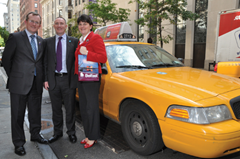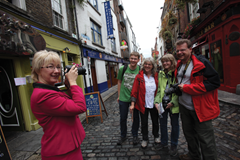The right place in government?
 Peter Cheney looks at whether tourism should be seen as economic or cultural policy, and the case for its own department in the Executive.
Peter Cheney looks at whether tourism should be seen as economic or cultural policy, and the case for its own department in the Executive.
Questions about who should set tourism policy appear dry and technical at first. However, its place in government affects how the subject is seen by officials and ministers.
Tourism is both economic and cultural. A festival’s organiser will hope that visitors absorb the atmosphere but also spend their pounds on local food, souvenirs and a bed for the night.
However, governments tend to have separate ministers for economic and cultural matters, and must therefore decide who should draw up tourism policy e.g. analysts and statisticians or more creative civil servants. Each approach has its merits.
Economy
Tourism has long been counted as part of our economic policy, as far back as the Ministry of Commerce in the old Stormont Government. The Northern Ireland Tourist Board was set up in 1948.
In 1966, the Ulster Yearbook warmly reported how “the tourist finds a wider variety of unspoilt scenery and uncluttered roads, supplemented by an ever increasing number of amenities, such as caravan parks, promenades, fishing and boating facilities.”
Visitor numbers reached 1 million in that year but took 24 years to return to that level, due to the Troubles. Visits then rose to 2.1 million in 2007 but the recession held back further growth.
Under direct rule, the Tourist Board reported to the Department of Commerce, later named the Department of Economic Development, which then became the Department of Enterprise, Trade and Investment (DETI) in 1999.
Scotland also sees it in an economic light. The relevant minister, Jim Mather from scenic Argyll, has an identical remit to Arlene Foster. That also ties in with American thinking; the US Department of Commerce is setting up a public-private Corporation for Travel Promotion.
Culture
Our other neighbours take a more ‘cultured’ view. Overall UK tourism policy falls to the Department of Culture, Media and Sport (DMCS) which plans to boost visitor numbers through the 2012 Olympics. Arts, museums, galleries and historic buildings also fall under its roof.
Similarly, the South has its Department of Tourism, Culture and Sport, tasked to “enrich Irish society by supporting the growth of a competitive and sustainable tourism industry and increasing access to, and participation in sport, the arts and culture.” It oversees Fáilte Ireland and co-sponsors Tourism Ireland, along with DETI. Wales places tourism under its heritage portfolio.
The same thinking, applied locally, would see the Department of Culture, Arts and Leisure (DCAL) taking the lead in tourism.
Setting up a dedicated ‘department of tourism’ is a more radical move, advocated by academic Stephen Boyd. The University of Ulster tourism professor points out: “Tourism in Northern has had a difficult history and I think you are looking at the development of what would be normally a very well established industry in other countries.”
A successful location must be seen as attractive, safe and accessible. This was once not the case in Northern Ireland, and is also true today in North Africa.
Government departments took notice of tourism when they saw its potential and around seven of them now have some role e.g. DETI (economic development), DCAL (culture), DARD (rural development, food and beverages) and DRD (infrastructure).
A single tourism department would cover “its ecological side, its cultural side and its economic-business side.” Canada and New Zealand have both taken this approach.
“I think one of [Northern Ireland’s] future industries has to be tourism and if we are really serious about this then we need to demonstrate that from a political perspective,” he says.
For the same reason, Alban Maginness prefers that it stays with DETI. He chairs the Assembly’s Enterprise, Trade and Investment Committee and does not see a strong case for moving it elsewhere.
To him, tourism should be an economic driver at a time when diversification is important.
“Given the opportunities we have now with peace and stability, tourism is effectively a no-brainer. What we have to do is concentrate our efforts, be innovative about it, be creative about it and push tourism.”
He thinks that the Tourist Board has made “great efforts” but would like to see more emphasis on training and standards. “I think that we either don’t train our people or don’t train them properly,” he comments, adding that catering and hotel careers should be seen as desirable professions for any young person.
Hotelier Lord Rana also sees DETI as the most appropriate department but is calling for a separate Minister to “provide the focus and leadership this strategically important industry needs.” A single Enterprise, Trade and Investment Minister “cannot be expected to have command of everything.”
Product
Regardless of how it is developed and sold, there is a general agreement on why tourists comes to Northern Ireland: culture and heritage. “If you look at the top attractions in Northern Ireland, they are very much cultural- and heritage- driven,” Boyd points out, citing the Ulster American Folk Park and the Giant’s Causeway. Americans and others from the Irish diaspora take a great interest in family history or ‘roots tourism’. He wants to see DCAL providing more cultural opportunities for visitors as well as Northern Ireland residents.
Maginness agrees: “Of course, there’s a cultural element to it. There’s a cultural product there to sell but essentially it is an economic driver. It’s in the sphere of economics.”
In Lord Rana’s view, tourism and cultural policies are “both essential elements of economic development”. Cultural tourism, he noted, “can help offset the fundamental problem we have with climatic conditions.”






